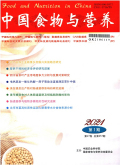中国食物与营养2024,Vol.30Issue(8):54-61,8.
超加工食品摄入与慢性肾脏病发病风险相关性的Meta分析
Meta-Analysis of The Relationship Between Ultra-Processed Food Intake and The Risk of Developing Chronic Kidney Disease
摘要
Abstract
[Objective]A meta-analytic approach was used to evaluate the association between ultra-processed food intake and the risk of developing chronic kidney disease.[Method]Computerized searches of PubMed,embase,Cochrane Library,Web of Science,China Knowledge,Wanfang,and Wipro databases for observational studies on ultra-processed food intake and risk of developing chronic kidney disease were conducted with a time frame from the time of library construction to February 2024,and the literature data were extracted independently by 2 researchers,and the quality of the literature was evaluation and statistically analyzed using Stata 17.0 software.[Result]After an initial literature search of 1 508 articles and the final inclusion of 7 studies(2 cross-sectional and 5 cohort studies totaling 408 492 participants from 6 different countries),meta-analysis of the highest dose group of ultra-processed food intake and the risk of chronic kidney disease(CKD)prevalence showed that ultra-processed food intake increased the risk of CKD prevalence(OR=1.18,95%CI:1.13-1.23).Subgroup analyses further suggested that the study region[Europe(OR=1.30,95%CI:1.10—1.54),and North America(OR=1.19,95%CI:1.09—1.29)],the type of study[cohort study(OR=1.22,95%CI:1.11—1.33)],whether corrected for dietary patterns[yes(OR=1.22,95%CI:1.12—1.34)],dietary assessment tool[FFQ(OR=1.22,95%CI:1.13—1.32)],UPF intake calculation[energy-adjusted UPF consumption[g/(1 000 kcal·d)](OR=1.58,95%CI:1.07—2.34),number of UPF servings/d(OR=1.19,95%CI:1.09—1.29),and UPF intake of total weight(%g/d)(OR=1.25,95%CI:1.10—1.42)]in ultra-processed food intake all increased the risk of chronic kidney disease.[Conclusion]Ultra-processed food intake is associated with an increased risk of developing chronic kidney disease.关键词
超加工食品/慢性肾脏病/Meta分析/系统回顾Key words
ultra-processed food(UPF)/chronic kidney disease/Meta-analysis/system review引用本文复制引用
王秀芝,赵梅,程光敏,唐涛,洪丽..超加工食品摄入与慢性肾脏病发病风险相关性的Meta分析[J].中国食物与营养,2024,30(8):54-61,8.基金项目
安徽省高校人文社会科学研究项目重大项目(项目编号:SK2021ZD0030) (项目编号:SK2021ZD0030)
安徽省自然科学基金面上项目(项目编号:2308085MH285) (项目编号:2308085MH285)
2023年度安徽医科大学护理学院研究生青苗培育项目(项目编号:hlqml2023071). (项目编号:hlqml2023071)

